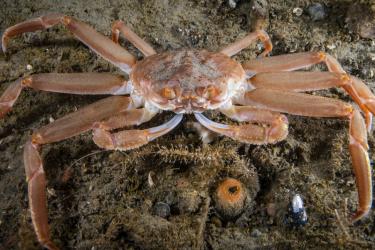NOAA has partnered with McKenzie River Trust to increase natural floodplain connectivity along Finn Rock Reach in Oregon’s McKenzie River. The project is restoring important habitat for threatened Upper Willamette River Chinook salmon.
Monitoring from earlier phases of the effort has shown more Chinook salmon using the restored habitat. Restoration at Finn Rock Reach will continue to increase the amount of habitat available, aiding recovery of the species in the Upper Willamette River Basin.
Like all living organisms, streams have a natural life-cycle. Human activities have significantly altered the cycle of the McKenzie River over the last century. Gravel mining, dams, logging, and construction disconnected the river from its floodplain. This left a single channel with fast-moving water. These also reduced the wood and gravel in the stream—components that provide critical habitat for salmon.
The Finn Rock Reach project will involve process-based restoration to Stage 8 condition. In process-based restoration, the stages range from 0–8. Stage 0 represents a stream prior to human disturbance, and Stage 8 represents a previously degraded stream that has been reconnected to its floodplain. Stages 1–7 represent the various levels of degradation and restoration in between, which are normally regulated by natural flooding. Human impacts can cause streams to get stuck in a degraded life-cycle stage, where natural processes stagnate. Process-based restoration to Stage 0 or Stage 8 condition resets those natural processes.
In this Stage 8 restoration project, McKenzie River Trust will conduct work on 85 acres along the McKenzie River. They will reconnect it to most of the floodplain and slow down the flow of the water. Installing approximately 3,200 pieces of large wood and whole trees throughout the project area will also provide higher-quality salmon habitat. This will create additional channels and pools, connecting to groundwater, and retaining gravel for Chinook salmon spawning.
The restoration effort is funded in part through Community Project Funding, or Congressionally Directed Spending. Through Community Project Funding, members of Congress request funding for specific projects in their communities. In 2022, the project received nearly $1.7 million in Community Project Funding through the NOAA Fisheries Office of Habitat Conservation.
Areas like Finn Rock Reach are crucial for the recovery of Chinook salmon in the Willamette River Basin. The Office of Habitat Conservation has a long history of supporting our nation’s fisheries and protected resources by providing funding and expert technical assistance for habitat restoration and protection efforts. By working closely with our local partners, we are able to help develop and implement large-scale, floodplain-level restoration projects like these that support species recovery.
The work is part of a suite of projects being implemented by McKenzie River Trust and partners, including:
- U.S. Forest Service
- McKenzie Watershed Council
- Eugene Water & Electric Board





